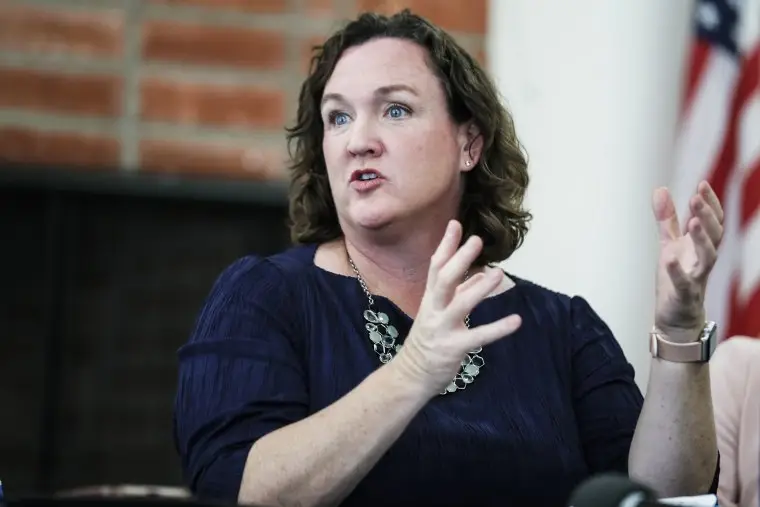
SVB collapse: Warren and Porter unveil bill to repeal Trump bank law
WASHINGTON — A group of Democrats led by Sen. Elizabeth Warren of Massachusetts and Rep. Katie Porter of California will unveil legislation Tuesday to restore bank regulations that were undone under then-President Donald Trump in 2018, seeking to fix what they say was the cause of Silicon Valley Bank's collapse.
The legislation, first reported by NBC News, would repeal the centerpiece of a law passed on a bipartisan basis by the Republican-led Congress in 2018, which eased Dodd-Frank financial regulations on midsize banks by raising the “too big to fail” threshold from $50 billion in assets to $250 billion.
“In 2018, I rang the alarm bell about what would happen if Congress rolled back critical Dodd-Frank protections: Banks would load up on risk to boost their profits and collapse, threatening our entire economy — and that is precisely what happened,” Warren said. “President Biden called on Congress to strengthen the rules for banks, and I’m proposing legislation to do just that by repealing the core of Trump’s bank law.”
DOJ and SEC open probes into the Silicon Valley Bank collapse
March 14, 202302:14The Warren-Porter bill would restore the threshold established in 2010 for enhanced capital requirements and stress tests in an attempt to prevent future failures like those at SVB and Signature Bank last week.
The legislation will be formally introduced with a raft of original co-sponsors, according to Warren's office — including Sens. Tammy Baldwin, D-Wis., and Bob Casey, D-Pa., who both face re-election in competitive states in 2024, as well as Reps. Pramila Jayapal, D-Wash., the chair of the progressive caucus, and Ro Khanna, D-Calif., who represents SVB's district, and Sen. John Fetterman, D-Pa., who serves with Warren on the Banking Committee.
Porter, who is running for the Senate seat held by Sen. Dianne Feinstein in a crowded race against several prominent House Democrats, said the bill would “restore common-sense guardrails that keep corporate greed in check and restore confidence in our financial system.”

Another co-sponsor of the bill is Rep. Ruben Gallego, D-Ariz., who is running for the Senate seat held by Sen. Kyrsten Sinema, I-Ariz; Sinema voted for the 2018 legislation when she was a House member, while Gallego opposed it.
The new bill is likely to reignite divisions between Democrats dating back to the 2018 fight. At the time, Warren pressured senators to block the GOP-led deregulation bill, but 17 Democrats voted with Republicans, giving them enough support to break a filibuster and pass it. Proponents argued that many small and midsize banks were being stifled by the enhanced regulation passed in the wake of the 2008 financial crisis and could operate better without it.
Among the banks affected by the easing of regulations in the Trump-era measure was Silicon Valley Bank, which joined an array of midsize and community banks lobbying for that relief at the time. The Warren-Porter bill would not repeal the entire 2018 law, but rather the core of it — Title IV, called “Tailoring Regulations for Certain Bank Holding Companies” — that set asset limits for which banks were subject to federal scrutiny.
Some of the Democratic supporters of the 2018 law, including Sen. Mark Warner of Virginia, say it set appropriate levels of regulation on midsize and community banks.
Sen. Jeanne Shaheen, D-N.H., who voted for the 2018 bill, said Tuesday that she stands by her vote.
“I think it’s early. We need to complete the investigation of what actually happened at Silicon Valley Bank. All the regulation in the world isn’t going to fix bad management practices, and it appears that that’s one of the problems at SVB,” Shaheen said. “But depending upon the outcome, I think it’s appropriate for us to take a look at what we did and see if it still holds.”
The failure of SVB has reopened the debate over financial regulation. It's far from clear the Warren-led bill can get the necessary 60 votes to advance in the Senate. And if it does, it would be a tougher sell in the House, which is controlled by Republicans who voted for the deregulation measure in 2018.







